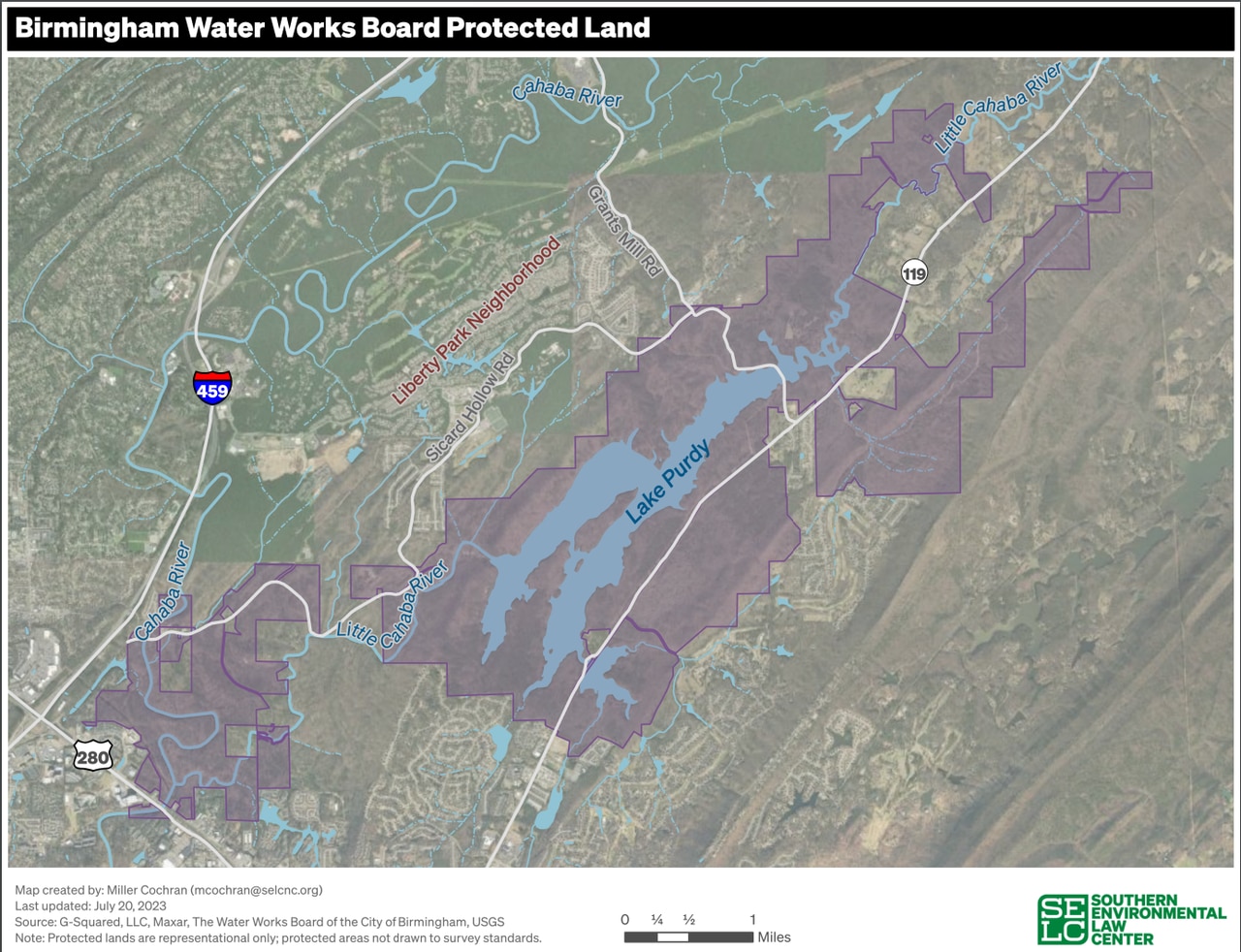Birmingham Water Works settles suit to protect land near drinking water intake
Birmingham environmental groups are celebrating the end of a 22-year struggle to protect sensitive land around one of the city’s largest drinking water sources.
The Birmingham Water Works Board and the Alabama Attorney General’s Office agreed to a settlement with the Cahaba River Society and Cahaba Riverkeeper that will require the Water Works to protect 7,000 acres of land surrounding Lake Purdy, the Cahaba and Little Cahaba River from development.
Jefferson County Circuit Judge Javan Patton signed off on the settlement agreement Thursday.
Beth Stewart, executive director of the Cahaba River Society said agreement was a win for all Birmingham water customers because the natural forested area that helps purify and protect the city’s water source will be left intact.
“The more pollution there is in the river, the more it costs to clean it out of our drinking water,” Stewart told AL.com. “And the more it costs us as customers to have clean drinking water.
“The Water Board, knowing that, has purchased this watershed forested land for generations to safeguard our drinking water supply.”
The shaded area shows the roughly 7,000 acres near a Birmingham Water Works intake to be protected for 75 years under a new settlement agreement.Southern Environmental Law Center
The Birmingham Water Works Board released a statement Thursday calling the agreement a “groundbreaking settlement aimed at fortifying the protection of the crucial water source that serves the Birmingham metropolitan area.”
The Birmingham Water Works says it provides drinking water for nearly 770,000 people in five counties in the Birmingham metro area.
“This agreement underscores this utility’s commitment to provide safe and affordable drinking water to our service area,” BWW General Manager Michael Johnson said in the news release. “Our responsibility extends beyond the present moment, and this collaboration ensures that our precious water resources remain protected for generations to come.”
Settlement ends long legal fight
The Birmingham Water Works Board had agreed in a 2001 court settlement to preserve the land in question, but by 2017, conservation groups argued that the Water Works was not living up to its agreement.
The Water Works in 2017 created a conservation agreement that still would have allowed the board to sell off land within the area for development in the rapidly growing area along U.S. Highway 280. Stewart said a portion of the land was sold to a developer and that Water Works Board members had discussed selling additional portions of the land in committee meetings.
The groups filed suit in 2021, arguing that the Water Works agreement did not protect the land, as it had agreed to do 20 years earlier.
The Alabama Supreme Court sided with the environmental groups in 2022, ruling that the Water Works Board had not formed valid conservation easements because by definition, those agreements involve an outside party supervising conservation restrictions. The court ruled that the Water Works could not be both the owner and enforcer of a conservation easement.
The Alabama Attorney General’s Office then filed an appeal arguing that the original 2001 agreement was a “mutual mistake” and asking the court to modify or throw out the 2001 agreement to “to best achieve the parties’ original intent.”
The revisions would have allowed the Water Works to put the land under a “watershed protection agreement” rather than a conservation easement. That would have allowed the Water Works to decide whether development would be harmful to the water system rather than blocking it altogether.
“Part of the concern was the recognition that the promise that had been made, just had not been fully, legally carried out,” Stewart said.
This week’s settlement agreement will end the environmental groups’ lawsuit and require that the Water Board enter into “watershed protective covenants” in Jefferson and Shelby County Courts within 60 days.
Those covenants will prohibit development activities on the land for 75 years even if the land is sold to an outside party. Any changes to the agreements must be approved by the court, and after 75 years, the plaintiffs have the right to ask the court to extend the terms of the agreement.
“I am excited to reach this agreement with our community partners,” BWWB Chairwoman Tereshia Huffman said in the news release. “This proactive step protects drinking water for our community for generations to come. It’s a testament to what can be achieved when we work together to prioritize the long-term well-being of our environment and residents.”
Environmental groups get right to enforce agreement
Cahaba Riverkeeper David Butler said one key provision the plaintiffs were seeking in the settlement was the ability to oversee and enforce the agreement, with annual scheduled inspections on foot and with drones of the protected area.
“We’re allowed foot inspections and drone inspections every year to ensure that the property is managed the way that the covenants require,” Butler said. “And so we have the opportunity to kind of ensure that the Water Works Board does what they have committed to do going forward, which was honestly a big part of what we were fighting for.”
Stewart said that her group is excited about the agreement and happy that all sides could reach a mutual agreement.
“There were plenty of times in the conversation where we were far apart,” Stewart said. “We listened to their needs. They listened to our interests. The Attorney General’s Office was also helpful in the process, in the end. We also appreciate that the city of Birmingham, there were council members who really wanted to see a positive resolution that would be protective of the land and the ratepayers and so they’ve been weighing in.
“And so, we feel like it’s come to a place that’s going to be workable for everyone: for the waterboard, for our organizations, for the ratepayers and the citizens of the region.”
Cahaba Riverkeeper and the Cahaba River Society were represented in the lawsuit by attorneys from the Southern Environmental Law Center.
